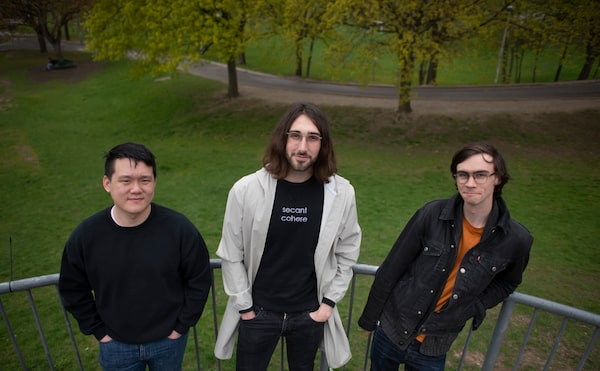
From the left: Ivan Zhang, Aidan Gomez and Nick Frosst, the co-founders of Cohere.Fred Lum/The Globe and Mail
Some of the world’s leading artificial intelligence experts are backing a Toronto startup co-founded by protégés of AI luminaries Geoffrey Hinton and Jeff Dean that is attempting to make it easier for humans to talk to machines.
Cohere Inc. is officially launching Tuesday, offering to plug companies into its machine-learning software over the internet by uploading three lines of code into their systems that provide access to their technology. Cohere claims its software will provide a richer understanding of human language, including semantics, sentiments and tone.
Early investors include Prof. Hinton, the University of Toronto professor and Google engineering fellow known as the “godfather” of deep learning; Ian Goodfellow, Apple’s head of AI; Raquel Urtasun, chief scientist and head of Uber’s ATG research and development division; Nvidia AI director Sanja Fidler and AI pioneers Fei-Fei Li and Pieter Abbeel. Toronto AI financier Radical Ventures wrote the first cheque to Cohere.
“The ability of computers to understand language has always been really clunky and awkward and it’s felt unnatural,” said chief executive and co-founder Aidan Gomez, who previously interned in Mr. Hinton’s Toronto lab and also worked closely with Mr. Dean, the head of AI and senior vice-president of research with Google.
Canada is gambling with its leadership on artificial intelligence
While a handful of internet giants have the capacity to invest in supercomputers and access massive amounts of data to train their language-generation technology, “these models are only available or accessible” to those few companies, Mr. Gomez said.
Cohere’s objective, he said, “is to bring that technology out of these incredibly affluent organizations and give it to everyone else so they can build on it – and so that every product we touch can have that same level of rich language understanding.”
Mr. Gomez co-wrote a pioneering 2017 paper at Google that invented a concept known as “transformers,” which improved the efficacy of “natural language processing” solutions that use AI algorithms to generate language. While working at machine-learning research operation Google Brain in Toronto, he met Cohere co-founder Nick Frosst, who had also worked with Prof. Hinton.
While they longed to translate gains in natural language processing from the research sphere to practical applications, they felt the work “wasn’t really getting into the hands of people to build things with it to improve systems and lives,” Mr. Frosst said. So the pair decided to leave Google in 2019 to start Cohere with fellow Toronto-based AI researcher Ivan Zhang.
Since then, they’ve assembled a global 25-person team and developed their own language model – not by building a massive computer, but taking a “scrappy approach” by renting access to a distributed cluster of smaller computers through a cloud provider “that ends up being feasible for a company of our scale,” Mr. Frosst said. Their model trains up on human language by surfing and reading billions of web pages.
To date, Cohere has partnered with three North American companies to develop its technology, including Toronto chatbot service provider Ada Support, and will start offering access to general users this week. “We’re interested in getting it into the hands of as many people who want it,” Mr. Frosst said. Users will be able to gain access to its algorithms that can help them anticipate text as they begin typing in plain language, as Google does within Gmail or its search engine.
Ada CEO Mike Murchison said he’s been impressed with the performance of Cohere’s technology, which has generated comparable results in tests to what Ada’s chatbot technology – used by many internet companies to communicate with customers – can generate. But it is still “really early,” he added. “I think it is genuinely transformational if it works. It’s actually pretty hard for a human to talk to a machine today … and they’re making meaningful gains toward that future. I think it’s very, very close.”
Jordan Jacobs, managing partner with Radical Ventures, said “enabling machines to understand language in a natural, human way is an extraordinarily large opportunity. We think they have an opportunity to build a globally significant business.”
Prof. Hinton is enthusiastic about his former Google colleagues’ new venture, noting Cohere “is a good company with good people who know what they’re talking about,” he said. “They’re managing to make big language models do amazing things.”
Your time is valuable. Have the Top Business Headlines newsletter conveniently delivered to your inbox in the morning or evening. Sign up today.
 Sean Silcoff
Sean Silcoff